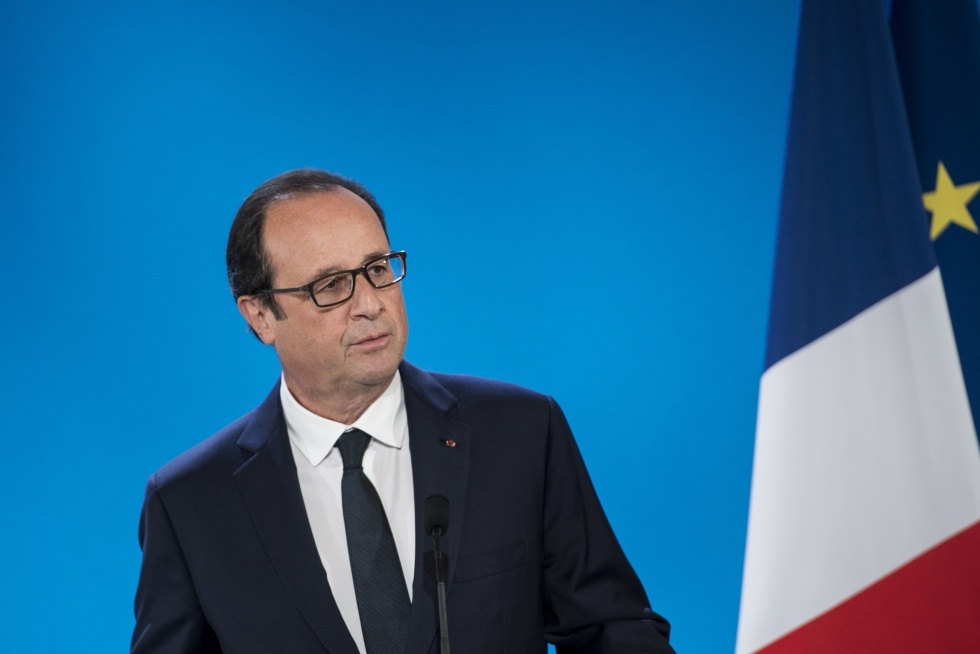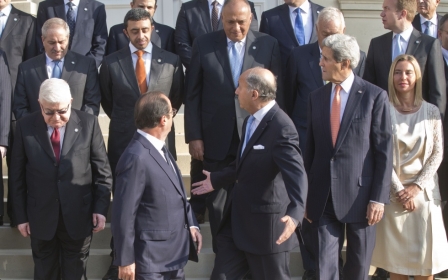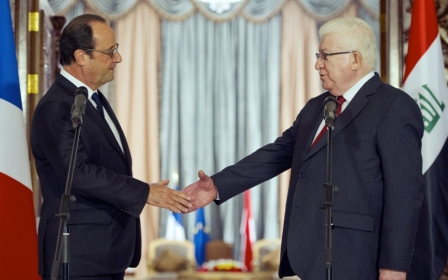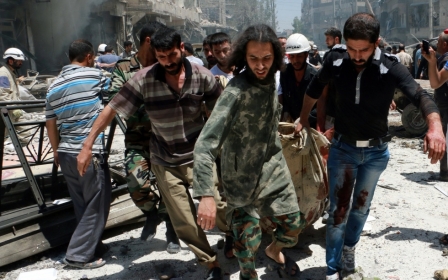Hollande's mission impossible

The global struggle against radical Islam is currently providing distinct relief to France’s President François Hollande. With his domestic approval rating at a pitiful 13 percent, and his self-styled reputation as a caring but politically effective socialist in tatters, the 60-year-old president of France still attempts to stride the world’s troublespots with dignity and purpose.
Hollande visited Iraq last week in preparation for Monday's meeting of a “coalition of the willing” which is gathering in Paris to discuss the country’s deepening security crisis. He tried to sound as statesmanlike as possible, as he pledged military support to fight the heavily armed Islamic State (IS), a group that has overrun vast swaths of Iraq. In a message to President Fouad Masoum, the French head of state spoke of a “global terrorist threat” that “knows no borders”.
Hawkish policy
There were 15 tonnes of humanitarian aid on the presidential plane from Paris to Baghdad, all of it designated for Kurds leading the fight against IS. But Hollande insisted there was steel to his policies, too. “I came to Baghdad to pledge France’s availability in providing even more military assistance to Iraq," he said.
He has already delivered arms and weapons instructors to Kurdish Peshmerga soldiers. This is regardless of what his own parliament and public opinion would make of it. Polls regularly show that the majority of the French people are against intervention in the affairs of other countries, and the Chamber of Deputies was certainly largely opposed to military action in Syria. Hollande was prepared to ignore this dissent.
Specifics about the full extent of this “military assistance to Iraq” is not yet clear, but there is no doubting that Hollande’s approach to the problems of the Middle East and North Africa (MENA) can be resolutely hawkish, just as it is in neighbouring areas. Since coming to power in 2012, he has sent troops to fight al-Qaeda in Mali, and to the Central African Republic (CAR). Both campaigns have been relatively successful in suppressing extremists who want to take control of these notoriously vulnerable states. The collapse of either - or, even worse, both - would create a massive danger to regional stability, and indeed to the security of the whole world.
Hollande was also one of the few western leaders to back military action against Bashar al-Assad's butchery in Syria, and especially Assad’s decision to use chemical weapons against his own people. Hollande has also called for “exceptional support” in Libya, a country that has fallen into anarchy since the French airforce helped “liberate” it from Colonel Muammar Gaddafi during the Arab spring revolt in 2011. Again, Mr Hollande has warned that “terrorism will spread across the region” if the armed militias which are continuing to bring chaos to the country are not dealt with.
Tough words, combined with courageous if limited interventions, certainly add up to one of the most successful aspects of Hollande’s generally catastrophic period of office. As unemployment in France spirals above 3.4 million, and the economy stagnates, Hollande has been ridiculed by political opponents. Even his ex-first lady, Valérie Trierweiler, has used a new book to portray him as a lying hypocrite in both his personal and professional life.
Former supporters, disillusioned by Hollande’s swing to the right, have also pointed to characteristic U-turns in foreign policy. During his election campaign, he vouched that he would withdraw French troops from the frontline of the war against terrorism, not least of all Afghanistan, where 88 of his country’s soldiers died during the coalition war against the Taliban.
Others are concerned about the way Hollande’s current commitment to protecting civilian lives is largely concentrated on Christian communities. He purposefully visited a church sheltering Christian refugees in Iraq, and has offered asylum in France to thousands fleeing from IS. His principal motivation for intervention in Syria was also his preoccupation with Christians in Assad’s secular dictatorship. This is all commendable, but such an ethical stance is by no means reflected in Hollande’s approach to the Palestinian civilians killed in their thousands by Israel during its latest military onslaught on Gaza over the summer.
Inconsistency and deceit
Such inconsistencies are particularly worrying to French Muslims, who believe that both Hollande and his notoriously chauvinistic prime minister, Manuel Valls, are using their foreign policy in the MENA region to stigmatise them. Tough new anti-terror laws are regularly conflated with a perceived threat from radical members of France’s five million plus Muslim community. Hollande and Valls often sound as though they view their principal enemy as Islam per se, rather than terrorism in the name of Islam.
Using the kind of weasel words for which he has become renowned, Hollande said, for example, that “surveillance” would be increased “at places of worship because secularism, one of France’s fundamental principles, directs the state to protect all religions”. This can be loosely translated as meaning more spies at mosques, because Muslims need protecting from themselves. Attempts to crack down on potential militants travelling abroad to fight have also had some disturbing consequences, including schoolgirls allegedly being threatened with criminal action for their postings on social media sites.
Hollande and his socialist lieutenants have regularly proved themselves happy to trample over civil rights in defence of their foreign policy in the MENA. Amnesty International was among the humanitarian organisations that expressed indignation when Paris street demonstrations against the war in Gaza were banned. The official deceit was that a fear of threats to public order - ones which accompany almost every protest in the traditionally radical French capital - outweighed outrage against the systematic destruction of innocent Palestinians in their own homeland.
It all adds up to policy that, despite the limited successes in Mali and CAR, is actually riddled with inconsistency and deceit. This muddled, secretive approach is well illustrated by accusations that France routinely pays millions of dollars for the release of hostages. There have been well-sourced claims in the US that France has paid a total of $125m in ransoms since 2008. Four French journalists were freed in April after being kidnapped by IS in Syria, shortly before two fellow prisoners from America were beheaded.
Hollande has insisted that France does not pay ransoms, but a well-sourced report in the German magazine Focus suggests that a deal with IS in fact included some $18m being placed in their coffers through international companies and shady middle men, including Turkish secret agents. However, Paris has categorically denied this report. In fact, one of the main reasons that the deeply sinister IS has grown into such a formidable fighting unit is because of the millions paid to it in ransom fees.
If Hollande is to continue to use his foreign dealings to draw attention away from his domestic failings, then he needs to work closely with the international community to ensure that common interests, and not just minority ones, are championed. This applies as much to supporting Arabs in the MENA region, as it does to respecting millions of Muslims living in mainland France.
- Nabila Ramdani is an award-winning journalist, columnist and broadcaster who specialises in French politics, the Arab world and Islamic affairs. Her twitter handle is @NabilaRamdani
The views expressed in this article belong to the author and do not necessarily reflect the editorial policy of Middle East Eye.
Photo credit: French President Francois Hollande speaks during the International Conference on Peace and Security in Iraq at the Quai d’Orsay on Monday (AFP)
New MEE newsletter: Jerusalem Dispatch
Sign up to get the latest insights and analysis on Israel-Palestine, alongside Turkey Unpacked and other MEE newsletters
Middle East Eye delivers independent and unrivalled coverage and analysis of the Middle East, North Africa and beyond. To learn more about republishing this content and the associated fees, please fill out this form. More about MEE can be found here.





